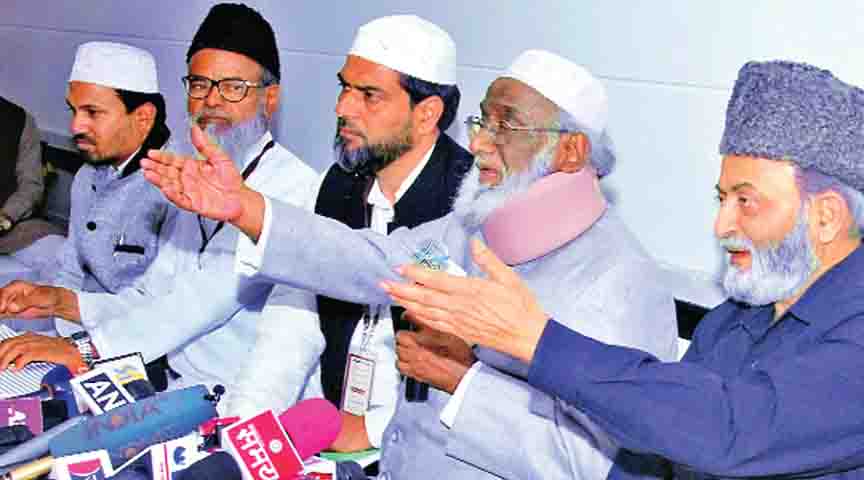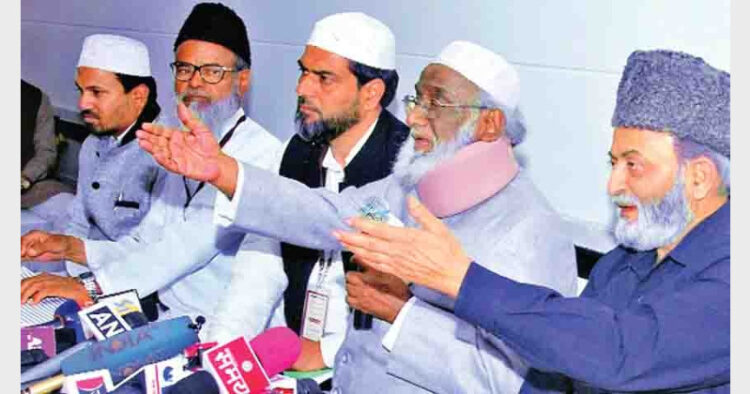 AIMPLB has placed an absurd argument while defending the custom of “Triple Talaq” but the evolution of Indian Legal System shows that there have been regular interventions in the religious laws. Even after that, in tune with the Indian tradition the fundamental right of practicing religious customs has been protected by law
AIMPLB has placed an absurd argument while defending the custom of “Triple Talaq” but the evolution of Indian Legal System shows that there have been regular interventions in the religious laws. Even after that, in tune with the Indian tradition the fundamental right of practicing religious customs has been protected by law
Dr RC Nagpal
Whenever there is a demand by the Muslim women and reformist Muslims to abolish quadruple marriage, triple divorce and halala, the All India Muslim Personal Law Board (AIMPLB), many of the Muslim clergymen—Imams, Maulanas, Maulavis and other similar
conservative Muslims oppose it. Their stand is based on two grounds. First, their law (Shariat) is divine in origin; it is ordained by Allah and the Prophet; and therefore, cannot be changed. Secondly, India is a secular country; we are guaranteed the right to freedom of religion as a fundamental right under the Constitution of India. Amendment in their law will be against their
freedom to follow their religion.
It is submitted that both the stands of conservative Muslims lack sound footings. First, at present the Shariat does not exist in the original form. Soon on the death of the Prophet the Muslim community was divided into two sects – Sunni and Shia. This was done by the human intervention. Both have their own schools of laws which differ from each other. Again these sects are sub divided by their scholars. The Sunnis have four schools namely Hanafi, Shafi, Maliki and Hanabali. The Shias have three schools namely Ithna Asharia, Ismalia and Zaidi. All these Sunni and Shia sub-schools differ from one another on what Shariat lays down on any subject. These schools are made by the Muslim human scholars, neither by Allah nor by the Prophet. Though the Prophet himself detested triple talaq it became fully lawful during the rule of Muavia by the authority of the state. How can it be accepted as divine? It has been abolished in a number of Muslim countries e.g. Egypt, Iran, Sudan, Jordon Morocco, Yemen, Pakistan and Bangladesh. The Supreme Court of India has also ruled against it. (Shamim Ara v. Uttar Pradesh , 2002 (7) SCC 520) Still triple talaq is common in the Muslim community.
During the British regime in India a number of Acts were passed which were applied to Muslims and the other communities of India, like Indian Penal Code, 1860, Indian Evidence Act,1872 and Indian Contract Act, 1872 etc. Although the Shariat has its own different rules on the matters of those Acts, these laws are applicable to Muslims as well. Some Acts were passed by the Britishers which applied to Muslims only such as Qazi Act, 1880, Mussalman Wakf Validating Act, 1930, Muslim Personal law (Shariat) Application Act,1937 and Dissolution of Muslim Marriage Act,1939. So all these are laws made by British, who are not Divine for Muslims.
When in 1985 the Supreme Court of India gave the judgement in the famous Shah Bano case [Mohd. Ahmad v. Shah Bano [AIR 1985 SC 945 = 1985 (2) SCC 556] that a divorcee Muslim wife is entitled to maintenance under section 125 of the Criminal Procedure Code (which is applicable to all in India) from her divorcing husband until her remarriage which was nullified by the Rajeev Gandhi Government under pressure from conservative forces and passed the Muslim Women (Protection of Rights on Divorce) Act, 1986 in order to overrule the Shah Bano decision.
In view of so enormous volume of the man-made law in force —more than half a dozen schools with different rules, British-made Acts of general application to all the citizens of the country regardless of their religions, some Acts enacted by Britishers and the Indian Parliament “Which Indian Muslims are governed by all the provisions of this divine Shariat?” Despite all these changes Muslims are free to perform their five religious duties namely Kalama (Tauhid), Namaz, Zakat, Roza and Haj.
It is only a very-very small fraction of the Shariat about which the Muslim women are asking for amendment. Their demand is that their fundamental rights to equality, non-discrimination on the ground of sex and
personal liberty guaranteed by Articles 14, 15 and 21 by the Constitution of the country which is adopted by all the people of India should be respected in respect of marriage and divorce. The right of a man to have two, three and even four wives at a time and his arbitrary right to divorce his wife without a reasonable cause and halala be
abolished. These laws undermine the dignity of women. The right to divorce must be given on reasonable grounds only and it must be equally available to wife also.
The AIMPLB and many Imams assert that Islam would be endangered by these amendments. Is really Islam so weak? Are these amendments interfere in the five religious duties of Muslims
namely, Kalma (Tauhid),Namaz, Zakat, Roza and Haj? If not so then even the second argument based on freedom of religion becomes weak. It may be made clear that as per the Constitution of India, nobody has any freedom in absolute terms. This exists in India only so much as it is granted by Article 25 of the Constitution in its Part III on Fundamental Rights. This Article also has two clauses which restricts freedom on the ground of, “public order, morality and health and to the other provisions of this Part all persons are equally entitled to freedom of
conscience and the right freely to profess, practice and propagate religion.”
In other words, as per this article public order, public morality, public health etc have primacy over the
freedom of religion. It has two clear implications. One, everyone has a duty to the constitution not to make any claim against public order, public morality, public health and any Fundamental Rights of others in the name of freedom of religion. Two, State has right to make laws in the interest of public order, public morality, public health and other Fundamental Rights. If they are reasonable they should not be resisted, rather they should be complied with. It is evident from this that the Fundamental Rights of the Muslim women to equality and personal liberty guaranteed to them by Article 14, 15 and 21 cannot be resisted in the name of the freedom of religion.
Clause (2) of Art 25 lays down that nothing in Art. 25 will affect the
operation of the existing laws or the new laws made by the State —if they regulate or restrict any economic, financial, political or other secular activity which may be associated with religious practice and if they provide for social welfare and reform—In fact it is this sub clause (a) of Clause (2) of Article 25 of the Constitution of India which makes India a secular state since its commencement in 1950. This allows State to make laws on matters relating to this ‘secular’ world, which includes, economics. Finance, politics and also second set of worldly activities, that is agriculture, business, industry, education, town-planning, health, public order, human relations, moral or immoral aspects thereof, law, crime and punishment, contract, evidence, marriage, divorce etc
The religious matters are for the clergy. They have the rights and duties to make policies and programmes about them. The secular matters are for the state. It has the rights and duties to make policies and programmes about them. There is a wall between these two fields and the two cannot interfere in each other is the classic interpretation of ‘secularism’. Thus scriptural fundamentalism cannot govern the secular matters. Likewise the state has no business to make laws for the spiritual matters. It is this ideology of secularism which is relied on by Article 25 (2) (a) of the Constitution.
And Article 25 (2) (b) lays down that insofar as the subjects of social welfare and reform are concerned the provision of Article 25 i.e. right to freedom of religion cannot stand in their way. The abolition of the custom of sati among Hindus and the custom of burqa among Muslims, child marriage and dowry in any community of India may be referred to as ready examples.
A woman is a daughter, sister, wife or mother of some man too. I wonder why men as father, brother and son did not revolt against the inhuman laws of polygamy and arbitrary divorce against women. Now when the women are asserting for humanitarian treatment towards them the Imams, Maulanas and Maulavies should react as fathers, brothers and sons also.
It may be concluded from the above discussion that Article 25 of the Constitution of India makes a compound of the freedom of religion and the freedom from religion. This may be considered a model for every progressive society. The demand of the Muslim women to make the Muslim law more humanitarian towards the weaker is justifiable, which all sections of society should support as a secular matter.
(The writer is Professor of Law, L.U. (Retd.) and Ex-Member,U.P. State Higher EducationCouncil)














Comments